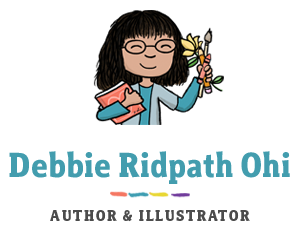FAQ: Where should I send my story? How do I get an agent?
This is a complicated question to answer because so much depends on your story, your situation and the market.
I lack the time to give individual advice these days, but I strongly advise you to connect with others in the kidlit community. Writing and illustrating are solitary activities, but trying to get published does not have to be. Join the SCBWI (Society Of Children’s Book Writers and Illustrators) and if you’re in Canada, join CANSCAIP (Canadian Society Of Children’s Authors, Illustrators and Performers). Both organizations have resources as well events where you can meet others. I strongly recommend the SCBWI’s THE BOOK: The Essential Guide To Publishing For Children, which is regularly updated.
You don’t have to have an agent to get your story published; I know several children’s book author/illustrators who have had successful careers without one. However, especially when it comes to the larger publishing houses in the U.S., many editors will only look at agented queries and submissions.
My agent is Ginger Knowlton at Curtis Brown Ltd., and she has been my agent for over 20 years. I adore her for so many reasons. When you are looking for an agent, do your research before signing with anyone.
My advice about finding an AGENT, based on my own experience and hearing about other experiences:
Do NOT sign up with an agent before doing your research. Having the wrong agent can be worse for your career than having no agent at all. Also, just because an agent is known to be popular / sought after does not mean they’re the right agent for YOU. That agent may be inundated with queries. They may have a LOT of clients already, having less time for you. They may spend more time on their “big name” clients. You may be better off approaching a new agent who is actively seeking to build his/her client base (but again….do your research).
Have realistic expectations. Getting an agent may enable your manuscript to reach more editors, but your manuscript may still not find a home. My agent and I sent out two of my middle grade manuscripts over the years and although I got very close sometimes (editor liked it but it got rejected by sales/marketing), we ended up pulling both from circulation.
Find out how an agent can help you before you sign with them. Are they respected in the industry? Do they have a reputation for offering the right manuscript to the right editor because they know what the editor likes? Do they already have a lot of contacts in the industry, or are they just starting out themselves?
Do they work on their own or with an agency that might have extra resources (like a foreign rights department)? One reason I feel lucky to be working with Curtis Brown is that the company’s resources help all clients. CB’s foreign rights department, for example, actively seeks to sell foreign rights for my books – their reps go to the Frankfurt Book Fair. CB’s agents all help each other. When someone approached me about a possible creative collab for television, for example, my agent sought advice from their tv/movie rights agent.
Are they a good communicator? Do they respond to emails in a timely manner? Would you feel comfortable reaching out to them if you have a question? I try to be respectful of my agent’s time since I know she has many other clients (I don’t bug her with minor stuff) but I also know that when I do ask her a question, she responds quickly and honestly. One way to find out more about an agent’s communication style is to talk to one or more of their current clients. This is yet another reason to become an active member of a kidlit/YA community; approaching someone who doesn’t know you with this kind of question is more likely to get a generic or wary answer.
Do you need an editorial agent? Some agents will helping to improve your manuscript before they send it out. Not all agents do. This may or may not be something you want, but you should decide this before you start approaching agents.
Attend children/YA author and illustrator conferences where you can meet agents like SCBWI events, both annual and regional. Many agents who attend these events are actively looking for new clients. Look for any opportunities which will let you meet agents face-to-face. In Canada, check out CANSCAIP events like Packaging Your Imagination.
Here are just a few places to find agents and agent info online:
My list of agents on Twitter who represent kidlit/YA
PBPitch list of picture book agents
Harold Underdown on Agents for Children’s Book Authors & Illustrators
Landing the Right Literary Agent and the Journey To Get There
Literary Rambles: lots of great info about different agents and what they’re looking for.
Agentquery.com: Searchable database on literary agents.
QueryTracker: database is frequently updated.
AgentQuery Connect: online social networking community for the publishing industry.
MSWishlist.com – Manuscript wishlists by agent. ( October 22, 2018: Site was down. )
Questions to ask a prospective agent: from Jim McCarthy at Dystel, Goderich & Bournet.
What Can I Expect From My Agent? from Editorial Ass.
Guide To Literary Agents: by Chuck Sambuchino. Esp good for finding new literary agents who are actively seeking clients.
The Truth About Being An Editorial Agent: by Molly Jaffa.
Querying Do’s and Don’ts from agent Rebecca Sherman
8 Myths About Literary Agents – by Ingrid Sundberg
Related resources:
So You Wrote A Picture Book, Now What? – by Christine Evans, Writer’s Digest
Twenty Tips For Writing Picture Books – by Pat Mora, Lee & Low
The Book: The Essential Guide To Publishing For Children – updated regularly by SCBWI
Overview of basics of children’s book publishing – compiled by Harold Underdown on his Purple Crayon blog
You can find more advice and resources in my Resources page.

